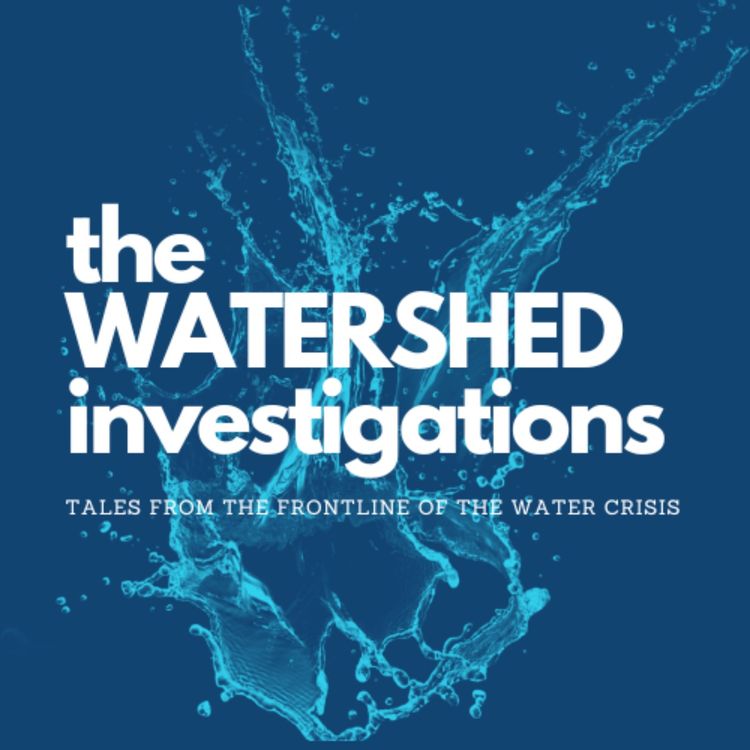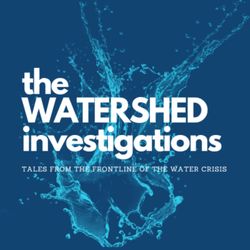Share

The WATERSHED investigations
Flint: still thirsty for clean water and justice
It’s been ten years since the US state governor of Michigan decided to switch the city of Flint from their clean drinking water supply in Detroit to the Flint river to save money. It led to one of America’s biggest public health crises.
Leana Hosea and Rachel Salvidge talk to Professor Laura Sullivan, a resident of Flint and a Professor of Mechanical Engineering at Kettering University. She tells us about the continued struggle for clean water and justice.
If you want to watch Leana Hosea's documentary on the Flint water crisis it's available to stream via a US vpn: https://vimeo.com/ondemand/thirstforjustice
It's also for sale via: https://www.bullfrogcommunities.com/thirstforjustice
In each episode, investigative journalists Rachel Salvidge and Leana Hosea bring you tales from the frontline of the water crisis, interviewing:
- Someone on the frontline of the water crisis.
- A world class expert, who can shed light on the causes and solutions to the issue in hand.
Find out more about Rachel and Leana's work at Watershed Investigations @WATERSHED_i
More episodes
View all episodes

3. Feargal Sharkey's had enough
24:39||Season 3, Ep. 3Feargal Sharkey tells Watershed's Rachel Salvidge why he's had enough of playing nicely in his quest to get water companies to stop dumping sewage in rivers and why he is now mobilising the masses to march on Parliament on Saturday 26 October 2024 to demand that industry and its regulators put an end to it.WARNING: CONTAINS F BOMB AND S BOMB.In each episode, investigative journalists Rachel Salvidge and Leana Hosea bring you tales from the frontline of the water crisis.Find out more about Rachel and Leana's work at Watershed Investigations www.watershedinvestigations.com @WATERSHED_i
2. Whole Truth Five
18:59||Season 3, Ep. 2Five Just Stop Oil activists receive record sentences for planning to block M25. Watershed attended the sentencing and heard from the celebrity supporters Chris Packham, the wildlife TV presenter, Dale Vince, the head of Ecotricity green energy company, and TV chef Hugh Fearnley Whittingstall. In each episode, investigative journalists Rachel Salvidge and Leana Hosea bring you tales from the frontline of the water crisis, interviewing:Someone on the frontline of the water crisis.A world class expert, who can shed light on the causes and solutions to the issue in hand.Find out more about Rachel and Leana's work at Watershed Investigations @WATERSHED_i
1. Rise of the right threatens the environment
15:05||Season 3, Ep. 1The EU Parliament elections have seen rightwing party gains, causing the President of France to call snap elections, possibly empowering the rightwing further. Nobel Peace Prize winning climate scientist, Wolfgang Cramer, talks to Leana Hosea about the implications for the environment.Find out more about Leana and Rachel's work at Watershed Investigations on socials @WATERSHED_ihttps://watershedinvestigations.com/
6. Life in a sacrifice zone
22:45||Season 2, Ep. 6Sacrifice zones are described by the UN as places where people suffer devastating physical and mental health consequences and human rights violations as a result of living in pollution hotspots and heavily contaminated areas. Greenpeace describes them as “geographical areas which are knowingly destroyed in the name of power and profit”.Katta Alonso lives in one such place. She leads the group, Women of the Sacrifice Zone in Quintero, Chile. In this episode she tells Leana and Rachel how their once beautiful coastal town has become a living nightmare. Hundreds of children have been hospitalised as a result of chemical leaks from the nearby industrial zone and they have one of the highest cancer rates in Chile. Theirs is of course not the only community living next door to heavily polluting facilities. David Boyd, the UN Special Rapporteur on Human Rights and the Environment and Associate Professor at the University of British Columbia, shared his expertise on sacrifice zones across the world.In each episode, investigative journalists Rachel Salvidge and Leana Hosea bring you tales from the frontline of the water crisis, interviewing:Someone on the frontline of the water crisis.A world class expert, who can shed light on the causes and solutions to the issue in hand.Find out more about Rachel and Leana's work at Watershed Investigations @WATERSHED_i
5. The briefing: Deep sea mining
17:56||Season 2, Ep. 5In this briefing, Leana and Rachel speak to Louisa Casson of Greenpeace, about the battle between miners and environmentalists over the treasure trove of metals at the bottom of the oceans. Casson sheds light on the recent efforts to get Greenpeace thrown out of the of the UN body overseeing controversial plans to begin deep-sea mining.Find out more about Leana and Rachel's work at Watershed Investigations @WATERSHED_iFrequency: FortnightlyDuration: Approx. 20 minutes
4. The accident that exposed South Africans to toxic chemicals banned in the EU
25:10||Season 2, Ep. 4When UPL's warehouse in Durban was set on fire in 2021, the toxic agrochemicals it housed washed into the river and out to sea, causing a huge marine die-off. Environmental Goldman Prize Winner, Desmond D'Sa, tells us how the catastrophe is still effecting locals, many of whom relied on the sea for their livelihoods.Some of the pesticides were banned in the EU and numerous other countries. There's been no ongoing health monitoring, but one report showed the chemical inferno "more than doubled" the risk of heart disease and lung cancer. There has been no evidence of deaths directly related to the accident.This is just one example of the catastrophes that can unfold when things go wrong, but some industrial complexes are polluting our seas as part of their day to day processes. We’ve recently published a couple of stories on this. One about the potential for mercury to be leaching out of abandoned oil and gas pipelines at the bottom of the North Sea:https://www.theguardian.com/environment/2024/feb/24/abandoned-oil-gas-pipelines-poison-pollution-risk-north-sea-scientistsAnother about how long-banned and toxic substances called PCBs are still being manufactured in huge volumes as byproducts when other chemicals are made:https://watershedinvestigations.com/industry-could-be-producing-more-cancer-causing-pcb-chemicals-today-than-at-any-other-point-in-history-despite-their-production-having-been-banned-more-than-40-years-ago/So much of this chemical pollution in our oceans goes unmonitored. Elsie Sunderland, Professor of Environmental Chemistry at Harvard University, tells us how a new initiative - Back to Blue - seeks to address this problem.
3. Why hundreds of toxic road runoff outfalls are polluting England's rivers
51:40||Season 2, Ep. 3A toxic cocktail of damaging chemicals created by road pollution is flowing into England’s rivers and no regulator is monitoring the scale of its impact on wildlife or public health. In this special episode - a collaboration with the Planet Possible podcast - Rachel Salvidge, Leana Hosea and Planet Possible host Niki Roach dig into the lesser known problem of river pollution from roads, speaking to the Environment Agency's director of water Helen Wakeham, National Highways' director of environmental sustainability Stephen Elderkin, and Stormwater Shepherds' director of operations Jo Bradley. See more of Watershed's work on toxic road runoff pollution in the Guardian:Hundreds of potentially toxic road runoff outfalls polluting England’s riversIn each episode, investigative journalists Leana Hosea and Rachel Salvidge bring you tales from the frontline of the water crisis, interviewing:Someone on the frontline of the water crisis.A world class expert, who can shed light on the causes and solutions to the issue in hand.Find out more about Rachel and Leana's work at Watershed Investigations @WATERSHED_iFrequency: Approx. fortnightlyDuration: Approx. 50 minutes
2. Gaza’s water crisis
52:11||Season 2, Ep. 2The people of Gaza are on the frontline of a water crisis. Since Hamas attacked Israel on 7 October, killing 1200 Israelis and taking hostages, Gaza has been under unprecedented bombardment, killing more than 28,000 Palestininans, many of them children. Most of the population are displaced and living in unsanitary conditions, with soaring rates of infectious diseases linked to polluted water and lack of sanitation. Children in Gaza have barely a drop to drink, according to UNICEF. In this episode Leana and Rachel examine the historic and current water crisis, speaking with:Dr Shaddad Attili, lead Palestinian negotiator for water at the Palestine Liberation Organisation in Ramallah in the West Bank.Professor Alon Tal of Tel Aviv University, an environmentalist and water management expert, who has founded several Israeli environmental organisations and was recently a Member of the Knesset with the Blue and White centrist zionist coalition.Professor William Schabas of Middlesex University, an international expert on human rights, international criminal law and genocide and was the head of a UN Committee investigating the 2014 Israel–Gaza conflict.Professor Mark Zeitoun of the Geneva Water Hub, a policy institute which focuses on hydro-diplomacy to prevent and resolve water-related conflicts.In each episode, investigative journalists Rachel Salvidge and Leana Hosea bring you tales from the frontline of the water crisis, interviewing:Someone on the frontline of the water crisis who is experiencing first hand pollution/drought/floods/extinction events and diseases driven by climate change and bad management.A world class expert, who can shed light on the causes and solutions to the issue in hand.Find out more about Leana and Rachel's work at Watershed Investigations @WATERSHED_iFrequency: FortnightlyDuration: Approx. 1 hour